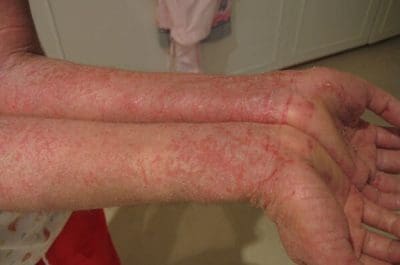Eczema Treatment
The Frustrating Facts About Eczema
Eczema can be completely frustrating. It doesn’t matter if you get it a few times a year or you deal with it every day, it’s no fun putting up with the itchy redness. There’s no cure for the skin condition, but there are several treatments out there. It’s important to work with an experienced dermatologist to control the itch, heal your skin, prevent flareups, and prevent infections.
Eczema Symptoms by Age
Eczema symptoms can be different for everyone. A lot of times it depends on the age of the person who has it.
- Symptoms in Infants
– Rashes on the scalp and cheeks
– Rashes that bubble up and leak fluid
– Rashes that may itch so badly that it interferes with sleep - Symptoms in Children
– Rashes behind the creases of elbows or knees
– Rashes that appear on the neck, wrists, ankles, and the crease between the buttocks and legs
– Bumpy rashes - Symptoms in Adults
– Rashes that are more scaly
– Rashes that commonly appear in the creases of the elbows or at the nape of the neck
– Rashes that cover a large area of the body
– Very dry skin
– Rashes that are permanently itchy
– Skin Fungal infections
Causes of Eczema
The exact cause of eczema is still a mystery. Most health professionals believe it develops because of a mixture of genetic and environmental factors. The risk is greater for a child to have eczema if one or both parents have it. Here are some environmental factors that have been found to also trigger eczema:
- Irritants
These include soaps, detergents, shampoos, and other products that contain chemicals your skin is sensitive to. Disinfectants, juices from fresh fruits, meats, and vegetables have also been found to irritate the skin. - Allergens
If your eczema flares up when you get around certain things like dust mites, pets, pollens, or mold, this is called allergic eczema. - Microbes
Certain bacteria, viruses, and fungi can cause eczema to flare up. - Hot and Cold Temperatures
The weather can play a part in eczema flare-ups. Also, if you sweat a lot and get overheated when you exercise, that can also be a trigger. - Foods
Food can be a big trigger for sensitive skin. Dairy products, eggs, nuts, seeds, soy products, and wheat have been known to make eczema worse. - Stress
Stress doesn’t exactly cause eczema, but it can make it worse. - Hormones
Hormones play a big part in the way the body operates; this is no different for eczema. Females can experience eczema when their hormones are changing, like when they are pregnant or at certain points in their menstrual cycle. It could be treated by dermatology for women.
Related Pages
- Treatment for Flaky Facial Skin from Dandruff and Rosacea
- Glytone
- Avene
- Microblading vs. Eyebrow Tattooing: What’s the Difference, and Why Does it Matter?
- Forehead Botox: Everything You Need to Know about the Cost, Risks, and Benefits
- Bellafill: A Long-Lasting, Effective Dermal Filler Solution
- Sebaceous Hyperplasia: Causes, Symptoms, and Treatment
- Laser Hair Removal: The Superior Alternative
- Neck Lift
- Wrinkle Treatment
- Molluscum
- Seborrheic Keratosis
- Mole Removal
- Actinic Keratosis
- Contact Dermatitis
- Itchy Scalp Treatment
- Atypical Nevi
- Hyperhidrosis Treatment
- Melasma Treatment
- Cysts Treatment
- Psoriasis
- Warts Treatment
- Eczema Treatment
- Seborrheic Dermatitis Treatment
- Rosacea Treatment
- Fungal Infections
- Hair Loss Treatment
- Acne Treatment
Quick Quote
Treatment for Severe Eczema
At-home treatments and prescription medications are often used to ease the awful itch that comes along with severe eczema. Researchers are still looking for new medications to treat severe eczema long-term. Here are some treatments that are suggested:
- Wet Dressings
These may be able to reduce symptoms for several days. This works by having a doctor apply a corticosteroid cream on the itchy area and then cover it with a wet bandage. A dry bandage will then be wrapped around. - Calcineurin Inhibitors
These are cream medications that modify your immune system by reducing inflammations. These can be used to treat eczema on the face and other eczema issues. - Oral Medications
If your eczema is widespread, you may be prescribed oral medication. These medicines work by slowing the immune system response, which can help reduce your eczema symptoms. These medications can bring some complications like nausea or high blood pressure, so they are typically only used for a short time. - Ultraviolet Light and Phototherapy
If your eczema doesn’t respond to creams, this light technique may be used. You’ll usually have to take about two to three trips to the office a week for the treatment. It will usually take one to two months for the treatment to take effect. - Injectable Medications
This is an option for eczema that is hard to tame with topical products. This will help lower inflammation in eczema that is moderate to severe. Right now, there’s only one drug available, but researchers are working on getting others approved by the FDA.
Caring for Eczema at Home
Sometimes you need immediate relief from eczema. There are several remedies you can use at home to alleviate the symptoms.
- Take lukewarm baths
- Moisturize every day
- For Dyshidrotic eczema treatment, pat skin dry. Make sure you don’t rub it because you could break open a blister
- Wear cotton and soft fabrics
- Use rubber gloves when you wash dishes as part of a hand eczema treatment
- Use a humidifier in dry or cold weather to keep the air moist
- Use mild soap
- For baby eczema treatment, moisturize with a fragrance-free cream or ointment immediately after their bath
- Learn your eczema triggers, so you know how to avoid a flare-up
- Keep fingernails short, so you don’t break the skin if you accidentally scratch
- Use a shampoo containing zinc pyrithione, salicylic acid, or coal tar for scalp eczema treatment
Winston Salem Dermatology Can Help Control Your Eczema
If you are struggling with eczema, you aren’t alone. The condition impacts over 10% of the population. While the dry, red patches aren’t contagious, they are painful and sometimes embarrassing. Don’t struggle with eczema alone. Let the skin experts at Winston Salem Dermatology help you feel your best. Not everyone responds to an eczema treatment the same way. So, we will find a customized solution to treat and relieve the pain and itchiness of your eczema.
Book your Consultation with Janet today! Call ☎ (336) 774-8636
Related Pages
- Treatment for Flaky Facial Skin from Dandruff and Rosacea
- Glytone
- Avene
- Microblading vs. Eyebrow Tattooing: What’s the Difference, and Why Does it Matter?
- Forehead Botox: Everything You Need to Know about the Cost, Risks, and Benefits
- Bellafill: A Long-Lasting, Effective Dermal Filler Solution
- Sebaceous Hyperplasia: Causes, Symptoms, and Treatment
- Laser Hair Removal: The Superior Alternative
- Neck Lift
- Wrinkle Treatment
- Molluscum
- Seborrheic Keratosis
- Mole Removal
- Actinic Keratosis
- Contact Dermatitis
- Itchy Scalp Treatment
- Atypical Nevi
- Hyperhidrosis Treatment
- Melasma Treatment
- Cysts Treatment
- Psoriasis
- Warts Treatment
- Eczema Treatment
- Seborrheic Dermatitis Treatment
- Rosacea Treatment
- Fungal Infections
- Hair Loss Treatment
- Acne Treatment
Quick Quote
Address
Winston Salem Dermatology & Surgery Center
1400 Westgate Center Drive,
Suite 200 - Winston Salem, NC 27103
Phone: 336.774.8636
Fax: 336.774.0265
www.WinstonSalemDermatology.com



